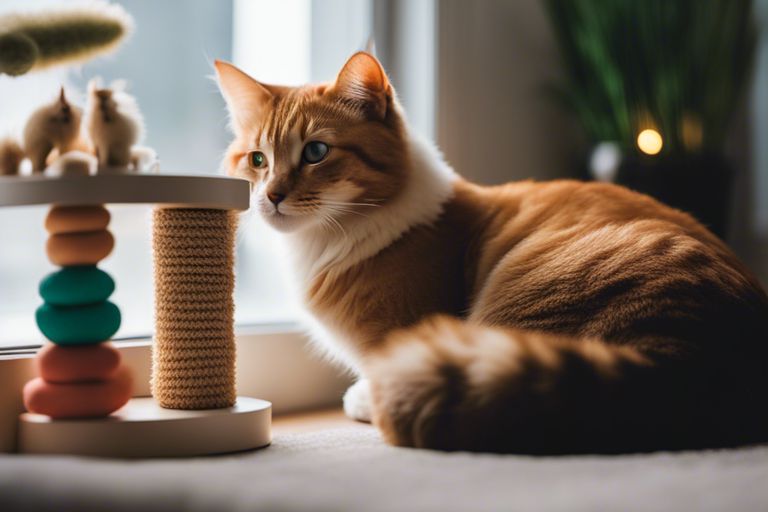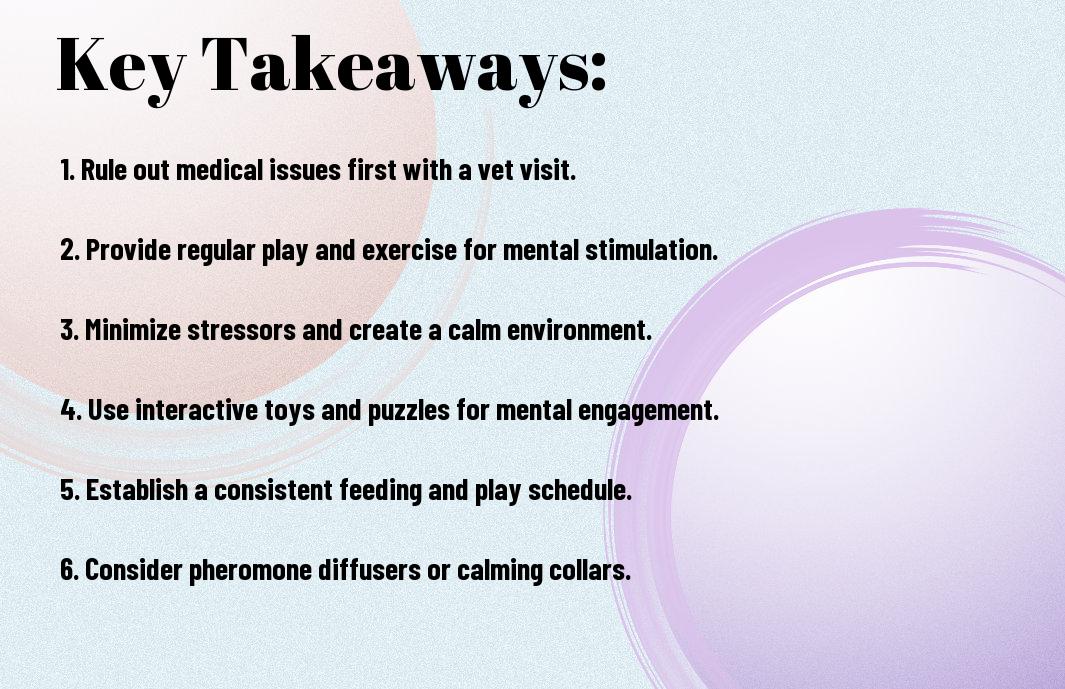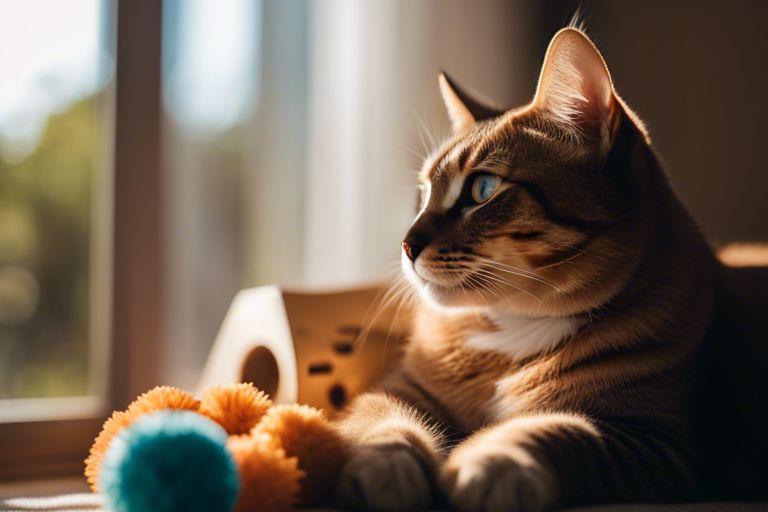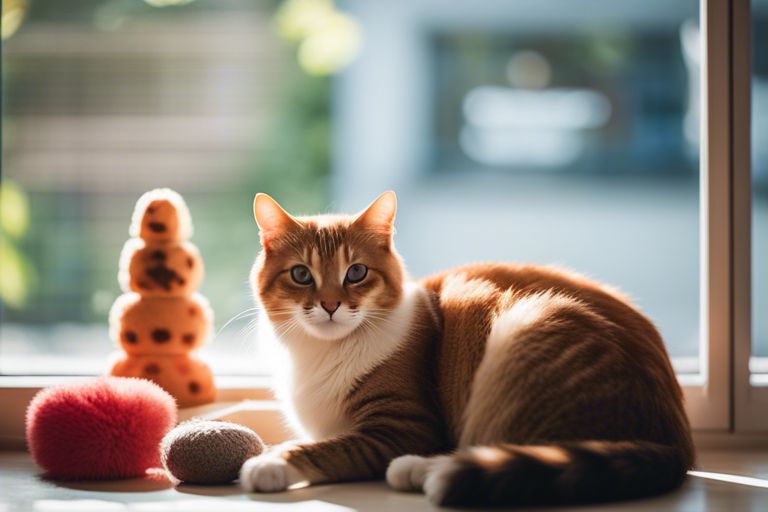Greetings, feline enthusiasts. You may find yourself at your wits’ end trying to figure out how to get your cat to stop meowing incessantly. Excessive meowing can be a sign of underlying health issues or behavioral problems that need to be addressed. It’s important to first rule out any medical conditions by taking your cat to the vet. Once you’ve ruled out any health issues, there are a few strategies you can implement to address your cat’s excessive meowing behavior. In this blog post, we’ll discuss some effective strategies for curbing your cat’s incessant meowing and restoring peace and quiet to your home.
Key Takeaways:
- Identify the underlying cause: Excessive meowing in cats can be a sign of various issues, including hunger, loneliness, or medical problems. It’s important to identify the root cause before implementing any strategies.
- Establish a routine: Cats thrive on routine, so creating a consistent feeding, play, and rest schedule can help reduce excessive meowing by fulfilling their basic needs.
- Provide mental stimulation: Engaging your cat with interactive toys, puzzle feeders, and regular playtime can help prevent boredom and reduce excessive meowing from attention-seeking behavior.
- Consult a veterinarian: If your cat’s excessive meowing persists or is accompanied by other concerning symptoms, it’s crucial to seek professional help from a veterinarian to rule out any underlying medical issues.
- Use positive reinforcement: When your cat is quiet and calm, reward them with treats or praise to reinforce the desired behavior and discourage excessive meowing. Consistency is key in training cats to stop meowing excessively.


Identifying the Causes of Excessive Meowing
Assuming you have already tried various strategies to get your cat to stop meowing excessively, it’s important to identify the underlying reasons for this behavior. Excessive meowing can be caused by a variety of factors, including medical concerns and environmental factors. Understanding the root cause of your cat’s meowing is crucial in finding an effective solution.
Medical Concerns
If your cat is meowing more than usual, it could be a sign of an underlying medical issue. Cats may meow excessively when they are in pain, discomfort, or feeling unwell. Common medical reasons for excessive meowing include urinary tract infections, hyperthyroidism, and arthritis. If you notice a sudden change in your cat’s meowing behavior, it’s important to take them to the veterinarian for a thorough check-up to rule out any potential health issues.
Environmental Factors
Environmental factors can also play a significant role in causing excessive meowing in cats. Changes in their routine, environment, or social dynamics can lead to increased vocalization. Additionally, factors such as separation anxiety, boredom, or stress can also result in excessive meowing. This can be exacerbated by a lack of stimulation or interaction in their environment. This is why it’s important to create a stimulating and enriching environment for your cat to help reduce their excess meowing behavior.
Behavioral Strategies
To address excessive meowing in your cat, you may need to employ some behavioral strategies. These techniques focus on modifying your cat’s behavior through positive reinforcement and establishing a consistent routine.
Training Your Cat with Positive Reinforcement
One effective way to reduce excessive meowing is by training your cat with positive reinforcement. This method involves rewarding your cat for desirable behavior, such as being quiet or coming when called. When your cat meows excessively, ignore the behavior and only give attention or treats when they are quiet. By doing so, you are reinforcing the desired behavior of not meowing excessively. This process may take time and patience, but it can be an effective way to modify your cat’s behavior.
The Importance of Routine and Consistency
Cats thrive on routine and consistency, and establishing a predictable daily schedule can help reduce excessive meowing. Make sure your cat has a regular feeding schedule, playtime, and interaction with you. Additionally, provide environmental enrichment, such as toys and scratching posts, to keep your cat stimulated and engaged. By maintaining a consistent routine, you can help alleviate stress and anxiety in your cat, which may contribute to excessive meowing. It’s essential to be patient and persistent in implementing these strategies, as changes in behavior may not occur overnight.
Environmental Modifications
However, before addressing the cat’s excessive meowing behavior, it’s crucial to evaluate the environment to identify any potential triggers that may be contributing to the behavior. Environmental modifications can play a significant role in reducing a cat’s excessive meowing.
Enrichment to Reduce Meowing
If your cat is meowing excessively, it may be a sign of boredom or a lack of mental stimulation. Enriching your cat’s environment with interactive toys, puzzle feeders, and climbing structures can help stimulate their mind and keep them engaged, reducing the urge to meow for attention. Additionally, rotating toys and introducing new items regularly can prevent boredom and keep your cat mentally stimulated.
Stress Reduction Techniques
If your cat’s excessive meowing is due to stress or anxiety, implementing stress reduction techniques can be beneficial. Creating a quiet and safe space for your cat to retreat to when they feel overwhelmed can help reduce their stress levels. Additionally, using pheromone diffusers or sprays can help create a calming environment and reduce anxiety-related meowing.
When to Seek Professional Help
Now, if you’ve tried various strategies to get your cat to stop meowing excessively and nothing seems to be working, it may be time to seek professional help. Excessive meowing can be a symptom of an underlying medical issue or behavior problem that requires the expertise of a professional.
Consulting a Veterinarian
If your cat’s excessive meowing seems out of character or is accompanied by other concerning symptoms, it’s important to schedule a visit to your veterinarian. Excessive meowing can be a sign of an underlying medical issue such as hyperthyroidism, diabetes, or even cognitive dysfunction in elderly cats. Your veterinarian can conduct a thorough physical exam and run diagnostic tests to rule out any potential health problems. It is important to address any medical issues that may be causing your cat’s excessive meowing, as ignoring them could have serious consequences for your cat’s health.
Working with an Animal Behaviorist
If your cat has been given a clean bill of health by your veterinarian but is still meowing excessively, it may be time to consult with an animal behaviorist. These professionals are trained to understand animal behavior and can help identify the underlying reasons for your cat’s excessive meowing. They can work with you to develop a behavior modification plan tailored to address your cat’s specific needs. A certified animal behaviorist can provide valuable insight into your cat’s behavior and help you implement positive reinforcement techniques to address the issue. It is essential to address the root cause of your cat’s excessive meowing to improve their quality of life and restore peace to your home.
By seeking professional help when necessary, you can ensure that you are addressing any underlying health or behavioral issues that may be contributing to your cat’s excessive meowing. Remember that your cat’s well-being is a top priority, and seeking professional help is a positive step towards finding a solution to the issue.

Strategies for Getting a Cat to Stop Meowing Excessively
With these considerations in mind, you now have several strategies at your disposal to help address your cat’s excessive meowing. From determining the root cause of the behavior to providing adequate stimulation and attention, you can take proactive steps to mitigate your cat’s incessant vocalizations. By incorporating these strategies into your daily routine and consistently reinforcing positive behavior, you can work towards reducing your cat’s incessant meowing and fostering a quieter, more harmonious living environment for both you and your feline companion.
FAQ
Q: Why is my cat meowing excessively?
A: Cats meow for a variety of reasons, including hunger, stress, attention-seeking, and health issues. It’s important to observe your cat’s behavior and consult with a veterinarian to rule out any underlying medical conditions causing the excessive meowing.
Q: How can I discourage my cat from meowing excessively for attention?
A: To discourage excessive meowing for attention, it’s important to not reward the behavior. Instead, ignore the meowing and only give attention and rewards when your cat is quiet. Providing plenty of interactive playtime and mental stimulation can also help reduce attention-seeking meowing.
Q: Are there any environmental changes I can make to help reduce excessive meowing in my cat?
A: Creating a calm and enriched environment for your cat can help reduce excessive meowing. This includes providing regular feeding times, ample toys and scratching posts, and a quiet, safe space for rest. Additionally, addressing any potential stressors in the environment, such as loud noises or changes in routine, can help alleviate excessive meowing.

Jayley, a devoted cat enthusiast, also writer for other cat blog as well. She aims to dedicated to providing comprehensive information, insights, and advice on everything you’d ever want to know about our whiskered companions.
